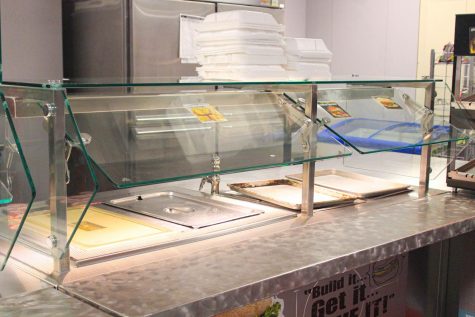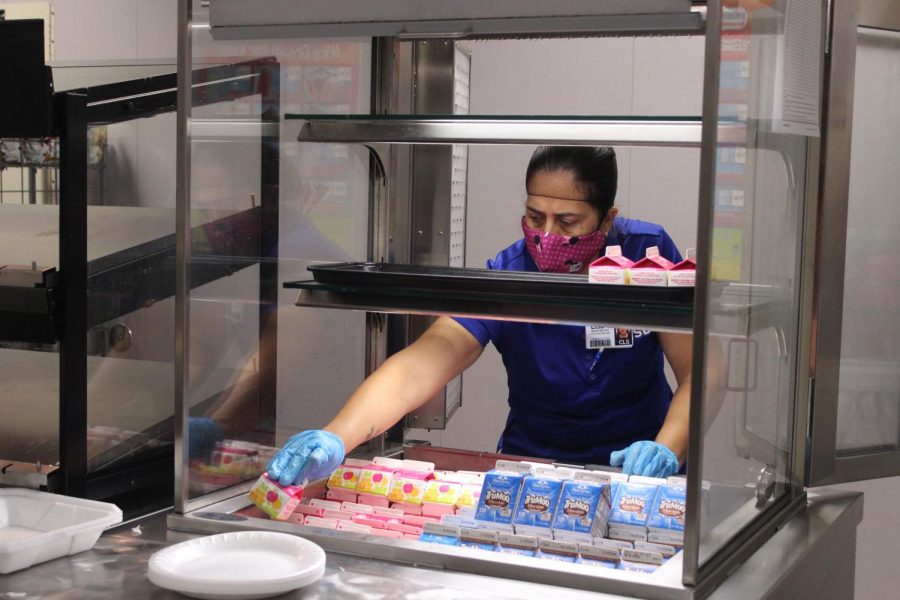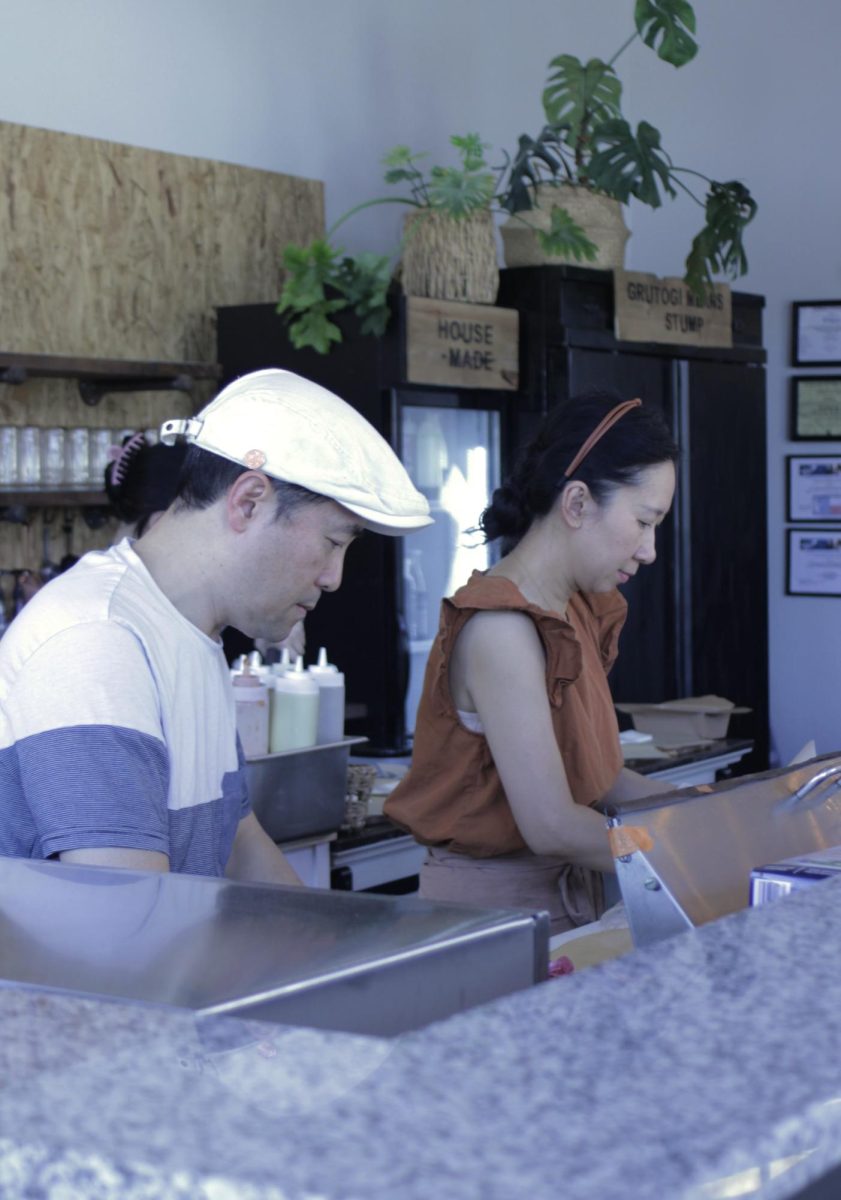Editor’s note: This story won superior for online in-depth news/feature stories in the 2022 TAJE Best in Texas contest.
Supply chain problems are causing shortages in the local area. The pandemic decreased consumer buying habits, so supply decreased.
Now that more people are back to work, demand has increased while supply struggles to catch up. Not to mention with many Americans leaving service industries like truck drivers, there are fewer people to move products around the country.
AP Economics teacher Matthew Stoeberl said that goods are sitting at the ports due to the worker shortage.
“A lot of it comes back to COVID,” Stoeberl said. “A lot of people stayed home from work or didn’t, or shifted their work from one industry to another.”
The shortages have affected the school as well. Whether you’re craving nachos at lunch, or your project needs colored photos, you may be out of luck. Certain products are scarce. In the cafeteria, grocery, paper and chemical supplies are low in stock.
Cafeteria Manager Kelly Gray said as they prepare student meals, every week they don’t have enough meat, paper goods and condiments. Often they have to turn to other campuses and borrow their leftover food.
“It’s a daily hustle basically where we go out and we look for the product to make sure you guys have it,” Gray said.
Gray contacts all 68 schools in the district whenever the cafeteria is low in supply. When she’s found a product they need, from spoons to chips, she drives to each school to pick it up.
Gray also said that for the next month, hamburgers will likely be unavailable.
“A lot of students were like, ‘What? Why?’ And I was like, well because of the shortages in the world,” Gray said.

The library staff are also facing issues in regard to the supply shortages. Printer cartridge ink and toner that once cost $100 is now $700. Finding affordable options is proving difficult for the staff.
“I have not really been able to locate it in my normal places,” library aide Debbie Virant said. “The few places that I have, it’s very expensive.”
This affects students who often use color photos for projects. Due to the shortage, more students have opted to print in black and white.
Virant said that some elementary schools in the district have run completely out of ink. If the library faced the same dilemma, students would need to adapt. Submitting to teachers through Canvas is an option, according to Virant.
“I’m optimistic that we won’t run into that, that we won’t completely run out,” Virant said.
The custodial department is also facing employment shortages. Custodian Kim Tran said that the janitor staff is short three people. Currently there are 10 custodians to clean the whole school. There used to be 13 to 15 total custodians.
Junior Scotlin Myers said the shortages have affected purchasing things from stores. Those products include furniture and food.
“You can’t get stuff anymore, or at least it’s hard to get those things,” Myers said.
Another problem is the huge decrease in semiconductor chips. These are used in the production of cars, computers and even electric toothbrushes. This will be detrimental to the manufacturing industry, according to Stoeberl.
“When you have a shortage of a key component, that’s going to lead to a shortage in everything made from those computer chips,” Stoeberl said. “It’s like a big web.”
Local corporations have had similar problems. Flower Mound Best Buy Supervisor Jason Brumley reported being low in TVs, computers and other electronics. Brumley also said they are low in gaming consoles, so if students want a PS5 for Christmas this year, they may want to wish for something else.
Target Executive Team Lead Lauren Casey said the store is low in paper products like toilet paper as well as certain foods. Like Best Buy, Target’s vendor supply chain is struggling to bring gaming consoles to the store.
“Since a lot of people are sitting at home and finding ways to be entertained, we’ve noticed a huge shortage in electronics,” Casey said.
With the holiday season coming up, many shoppers fear the shortages. They may want to buy products early before everything runs out. Stoeberl said this behavior is normal and that he’ll probably do the same. But this is another surge in demand, which could hurt the supply chain more.
“Everybody’s going to the retailer stores, because they want to beat the shortage,” Stoeberl said. “But that could speed up the shortage. And it could even increase prices even more.”
Casey said that Target will lack certain products until the last week in November. This holiday season, businesses are advising that consumers remain patient and plan ahead.
“Everyone’s trying to get the product and have it in the timeframe that they want but who knows if it’s going to be super accessible?” Casey said.
According to Stoeberl, correcting a shortage is not too complex. Raising prices of products motivates manufacturers to produce more. Increasing the wages of truck drivers and other workers would likely bring products from the ports to stores quicker. However, Stoeberl said this still has its conflicts.
“The misunderstanding is people believe when you fix the shortage, it means everyone gets it,” Stoeberl said. “No, it just means the amount of people that are willing and able to pay a price for an item equals the amount of items you have available.”
Industries that focus on the semiconductors want to increase production. However, Stoeberl believes it won’t be so simple. Buying proper facilities, training workers and obtaining the technology could take more time than retailers can afford.
“It’s gonna be six months to a year before we can crank up production ourselves,” Stoeberl said. “This is probably going to be an issue for a year, I think.”














